
|

|
Forum Index : Other Stuff : high-powered bicycle lighting system
| Author | Message | ||||
| Dinges Senior Member Joined: 04/01/2008 Location: AlbaniaPosts: 510 |
Hi all. Not really a story about windturbines but this may still be interesting for the odd reader who regularly uses a bicycle. I claim absolutely no originality for this project, building bike headlights out of halogen garden lights goes back at least a decade but it's still a useful project. After reading a bit about DIY bike lights made from garden halogen lights I decided this would be the perfect solution to my bicycle lighting problems. After having been blinded by oncoming cars too often (some don't feel a need to dim for cyclists) and, on occasion, having ended up in a ditch because of this, it was time to do something about it so the same problems wouldn't occur during the coming winter rides. That, plus the 2.5W dynamo-powered headlight just doesn't cut it in the part of my commute through a forest. The actual headlights are two waterproof garden lights. These are pretty cheap, use 12V (via a transformer), waterproof and, best of all, use standard MR16 bulbs which means it's easy to replace them with exactly the right bulb for your application, as there's a large selection in MR16 bulbs in all kinds of powers, beam widths, etc. 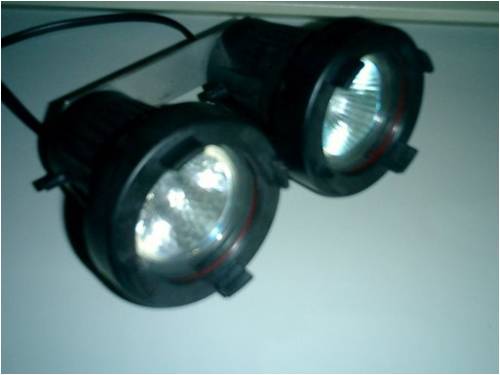
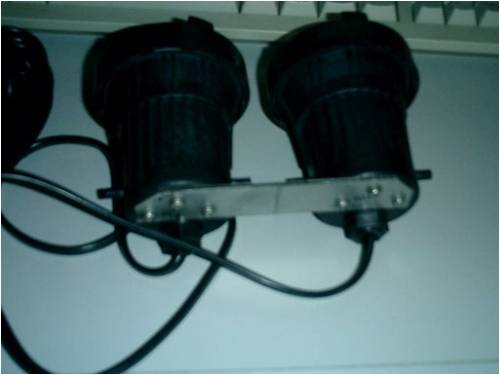
In this case I opted for two lamps, one with a 10W/38 deg. bulb (the 'low' beam), the other one a 20W/24 deg. bulb ('high' beam). The high beam is only intended to signal oncoming car drivers who neglect to dim their high beam. Now, the trick is to not run these bulbs at their rated 12V but at slight overvoltage, in this case 14.4 V (20% overvolted). This of course drastically reduces the lifespan of the bulbs (from 4000 hr to 600 hr) but that's not much of a problem as these bulbs only cost a few dollar. However, by overvolting, we get relatively much more light for only a little more power use. In other words, we get better efficiency (more exactly: efficacy), i.e. more lumen/watt. By overvolting by 20% the efficiency of these halogens becomes better than even the very expensive HID lamps. Of course, the price is a drastically reduced lifespan of the bulb. This link gives much more technical information: http://nordicgroup.us/s78/wattslumens.html Basically, by overvolting, we use 25% more power but get nearly double (+80%) light output. The 10W lamp thus draws 12.5W of power (and puts out nearly as much light as a not overvolted 20W lamp, 730 lumen), the 20W lamp draws 25W of power and puts out the equivalent of a 45W halogen lamp, about 1550 lumen. I welded a small bracket out of stainless steel to mount both lights to the bike. Looks pretty impressive when viewed from the front :) 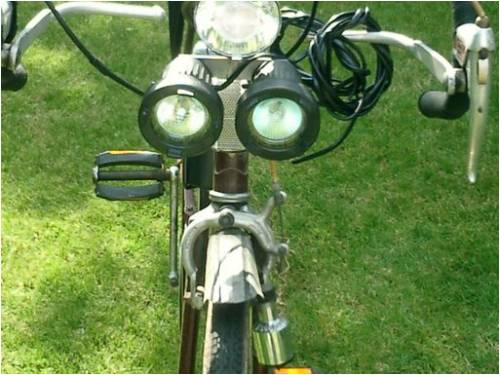
The batterypack to power it all consists of 12 NiMh C-cells of 4000 mAh each for a total system voltage of 14.4V. The batteries were attached to eachother with hotglue, then 0.18 mm thick nickel strips were spotwelded in place (hurray for the CD spotwelder!). More hotglue was added, wires were attached and everything packed in heatshrink. Then it was all inserted in a drink bottle with wide mouth, the spare room stuffed with styrofoam packing chips. 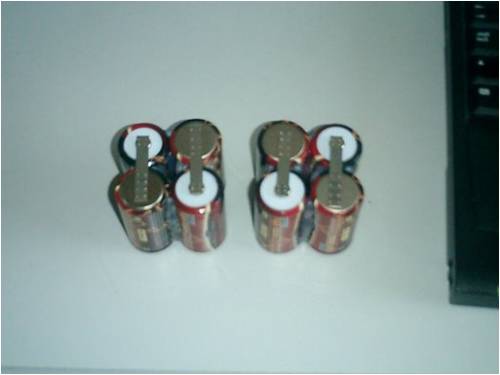
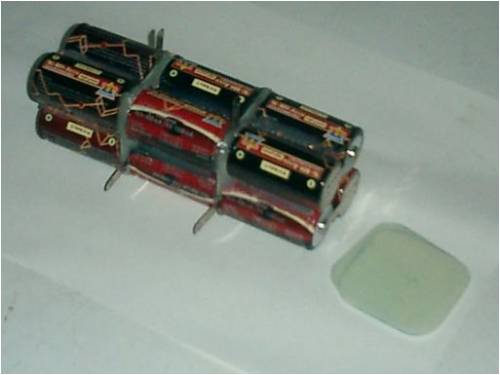
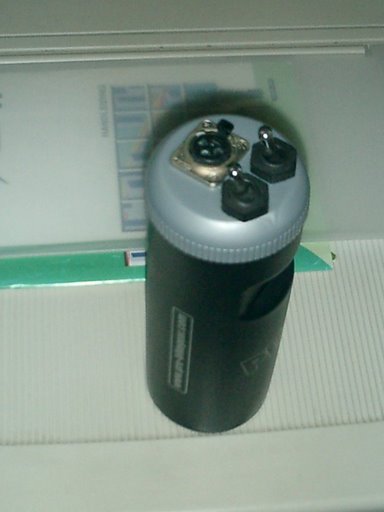
In the lid I installed a power connector, XLR in this case (unfortunately, not waterproof, but hopefully isn't an issue as the batterypack will not be left out in the rain; if it's outside the XLR plug will always be inserted) and two large waterproof toggleswitches. The large switches are handy in case of cycling with gloves on. The switch for the low beam is normal toggle, the one for the high beam is momentary toggle, as it's intended only for signalling (it draws about 1.8 A out of the 4Ah battery so not recommended to run the high beam for very long). The low beam should be able to run nearly 5 hours on one charge, the high beam about 2 hours. More than enough for my purposes. Here it is all wired together and installed on the main commuting bike (I'll admit, she's a bit old (1979), 23 years in my possession and doesn't look like much but by my estimate she has done 45.000-50.000 km, about once around the world): 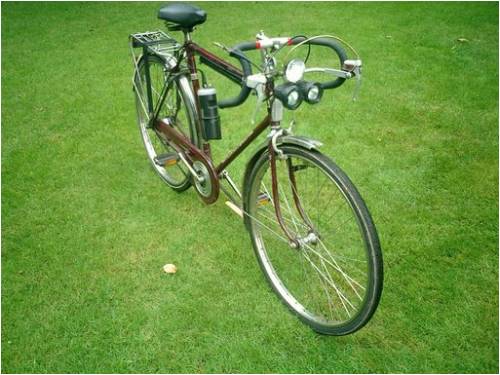
The tasting is the proof of the pudding. Here are two pictures made with the low beam and high beam on. The low beam provides plenty of light for normal cycling in utter darkness, but the high beam is like riding in daylight. One can spot cats hundreds of meters away... 
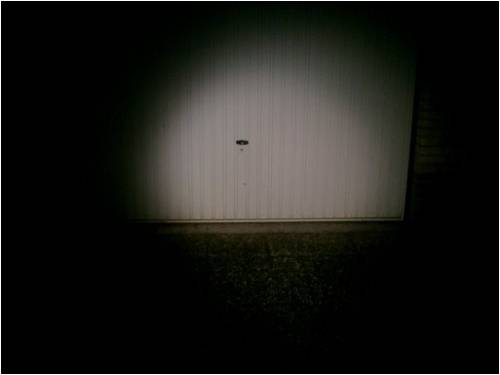
And high beam... 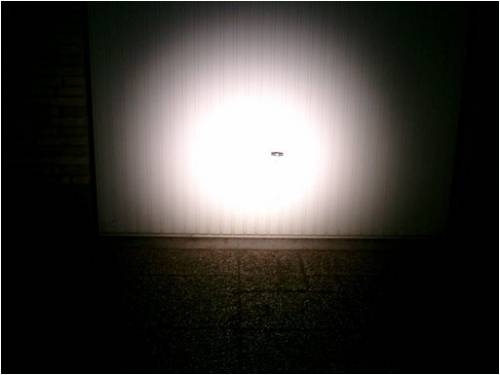
I still have to build a proper charger for the batterypack, but in the mean time a converted PC PSU with current control will have to do. All in all, a nice and simple but useful project. This light should provide mighty handy coming winter and prevent ending up in the ditch as happened on occasion in the past. Cost was 25E for both garden lights and 21 E for the batteries (about 100 US$ in total). All the rest was made from parts I had laying about. It hasn't been much cheaper than simply going to the bike store and buying a battery-powered bicycle light, but I now have a system that's a perfect fit for my desires. Tailor-made. For those that haven't fallen asleep yet, more detailed pictures can be found here: http://picasaweb.google.com/motorconversion/BicycleLight |
||||
| GWatPE Senior Member Joined: 01/09/2006 Location: AustraliaPosts: 2127 |
Hi dinges, the new LED replacement halogen inserts are available. A 5W version I have been using on my 24V battery system provides constant light output from 10V to 30V. These lights have inbuilt constant current supply to the LED and are not polarised on the DC input. They come in all sorts of colours as well. They are worth a look. Gordon. become more energy aware |
||||
| Dinges Senior Member Joined: 04/01/2008 Location: AlbaniaPosts: 510 |
Hi Gordon, Do you have a link to this product ? I did look into LEDs and HID too before I started this project but last time I checked LEDs didn't perform significantly better (on a lumen/watt basis) than overvolted halogens. The (3 pcs. of) Cree-LEDs I have in mind needed 11W of power to put out 700 lumen of light, whilst an overvolted halogen needs 12.5W of power for 730 lumen output. (theoretical values, I'm not able to actually measure the light output of my system). That was the situation in december 2007, things may have changed by now with newer, better LEDs. LEDs have some other downsides too: 1.) cost 2.) limited lifespan of some of the high-power LEDs 3.) heat (though that's just as much an issue with halogen) 4.) it's much harder to properly focus a LED into a beam whereas the MR16 comes with its own inbuilt and pre-adjusted reflector. At the moment I'm pretty satisfied with the performance of this system, but still curious about exactly what brand & type LEDs you are using. There's little doubt that it's just a matter of time before LEDs will outperform halogens or even HIDs in this application. Maybe that time has already arrived. 
Peter. |
||||
oztules Guru Joined: 26/07/2007 Location: AustraliaPosts: 1686 |
Chuckle chuckle. I just ordered another 1000 135000 mcd 10mm leds for a fisherman friend. 20 watts of these (near 400) are completely blinding. Seems to impress the squid a few hundred meters down anyway. ............oztules Village idiot...or... just another hack out of his depth |
||||
| GWatPE Senior Member Joined: 01/09/2006 Location: AustraliaPosts: 2127 |
Hi Peter, here is a photo. The units consume 4.5W@30VDC and 3W@10VDC. The units are rated 5W at nom 24VDC. They are comparable light output to a std QI downlight lamp. They hurt your eyes at several meters when looked at directly. There is a good heatsink on the LED and they are rated at 100000 hours life. The ones I have are probably made in china. This is one of the lamps. Gordon. become more energy aware |
||||
| Dinges Senior Member Joined: 04/01/2008 Location: AlbaniaPosts: 510 |
Thanks Gordon. The high-power Cree LEDs I checked out had lifetimes measured in 100s of hours, not 10.000s as is usual for LEDs. And on a lumen/watt basis they were only slightly better than overvolted halogen. Then there was the focusing issues, obviously the manufacturer already solved them in your product. And the binning/selecting of LEDs, and the cost, and... well, it just seemed like too much trouble for too little benefit for my particular application. No doubt in a few years time the situation will be very different, and that's another reason to like these modular MR16 lamps: you take it out and simply replace it with another bulb with the power rating and beam characteristics (and LED technology) if you desire so. Curious as to how many lumen/watt your light gets, I understand it can vary a lot depending on the quality of the LEDs and the 'bins' (selection) they were in. From about 30 lumen/watt to 85+ lumen/watt for the best ones. Oztules, does that make you a Fisherman's Friend ? 
135.000 mCd. Yikes. I played with a few 25.000 mCd LEDs in the distant past. The datasheet warned not to look into the beam. 'yeah, right', dinges said, as he pointed the bright red LED towards his eyes. [Expletives deleted] bright they were. For minutes I had a negative image (blue spot) on my retina, wherever I looked. Now, 135.000 mCd... The candela takes into account the focusing of the lightbeam (whereas lumen is a measure for total luminous flux), so, theoretically, by just focusing the light better, one can get infinite mCd figures. The tiny tiny focused spot of a laserdiode in a CD player gets a power density of 600 MW/m^2, yet only has a few mW of power :) Anyway, you bought 1000 LEDs. 400 are for your Fisherman's Friend. A quick calculation says that'll leave you with an excess of 600 LEDs... No doubt you have some devious plans for these. I have seen a satellite image somewhere of the seas around Japan, all lit up by squid fishing vessels. These boats must have many kW of lights and generator installed to light up the entire area as they did. I hope your 20 W worth of LEDs will do as well :) Seriously, have you considered (overvolted) halogen too ? Don't be fooled by the huge mCd numbers (marketing ploy of LED manufacturers), look at the lumens they put out (and lumen/watt, if you're interested in efficiency). Probably a halogen lamp is much easier to install than 400 LEDs. Not to mention the current source to drive all those LEDs (let me guess... a converted PC PSU ?... current-regulated 4-5V at, say, 5 A or so?) |
||||
Bryan1 Guru Joined: 22/02/2006 Location: AustraliaPosts: 1344 |
Peter I have 4 550,000mcd's hooked up in Amanda's circuit and it's been running on my nife bank for near a year now. I only put 75 mAthru them @ 15 volts and YES they do provide a decent light at night. When I was making it I accidently looked at the beam and had a headache for 3 days and I actually thought I'd lost part of my sight,anyway off memory I bought them off www.besthongkong.com and they had a great deal going. These led's are actually 5 in 1 and yes they are bright. Cheers Bryan 
Reason for edit:- Bloody typo  |
||||
oztules Guru Joined: 26/07/2007 Location: AustraliaPosts: 1686 |
Dinges, The real reason we went with leds was that you could make them waterproof at depth easily. A different fisherman was using the same lights as yourself, and used 2 12v trojans (sc225 I think). He had to take an 240v alternator set out with him if he was going to be away for a few days amongst the islands to charge them up. Plus they never successfully stayed water proof. They use them under the waterline of the dingy. So I built him these things.. here is the jig with about 108 diodes in it. It is only half loaded at the moment. 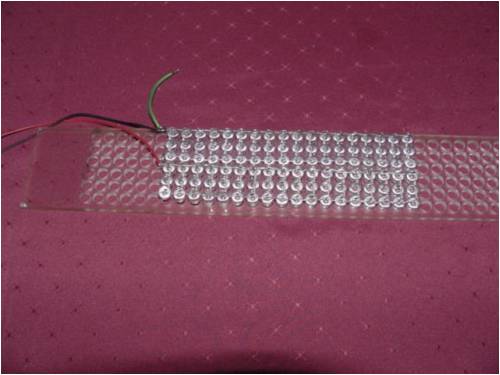
Then you pop them out with only the resistors holding them together like this.. (this is a bad example as there are two three strips, usually they are solid 6 strips) 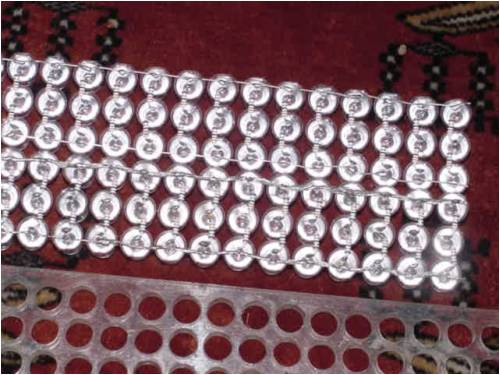
Then we use 12mm acrylic and mill out a basin 9mm deep, put the 200 leds in it, and pour in 4mm deep of west systems epoxy. This turns it into a solid light block, capable of being bolted to the underside of the boat to light up the water beneath, some on the back of the boat under the water line etc. They are indestructable, water proof, extremely bright and do the job with very little power drain for the light output. They look like this: 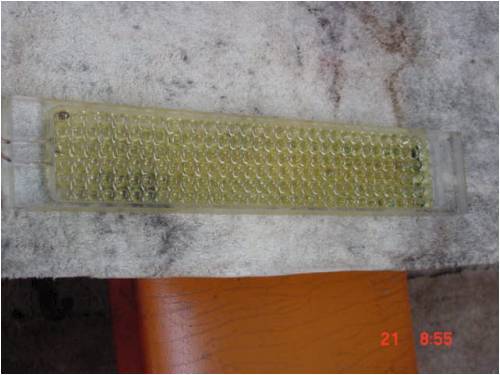
No fancy current limiting circuits, just resistors. No electronics under salt water. I have trained the fisherman to make their own now. They are so economic, one fellow uses a makita battery drill battery 12v, and runs it for 6 hrs a night on the warf ... he is a retired fisherman, but cant stop doing some sort of fishing.... I had to help him out. Another mob use them out near the continental shelf and drop them hundreds of meters down and slowly raise then with the squid following them up to the ships normal 3000w lights. The LEDS are nominally 12 degrees spread, but the refractive index of the water makes that closer to 50 degrees which spreads the light out nicely. If we used full epoxy, instead of just 3-4mm to waterproof and shockproof it, the refractive index between the epoxy and the resin in the leds kills all of the leds lens design completely. After designing and building the first few, they have taken on a life of their own, and are being built and used for deck lighting, gunnel lighting, underwater flounder lights and a zillion other uses I don't even know about now..... I will be leaving a legacy of blinded fish behind I think. ........oztules Village idiot...or... just another hack out of his depth |
||||